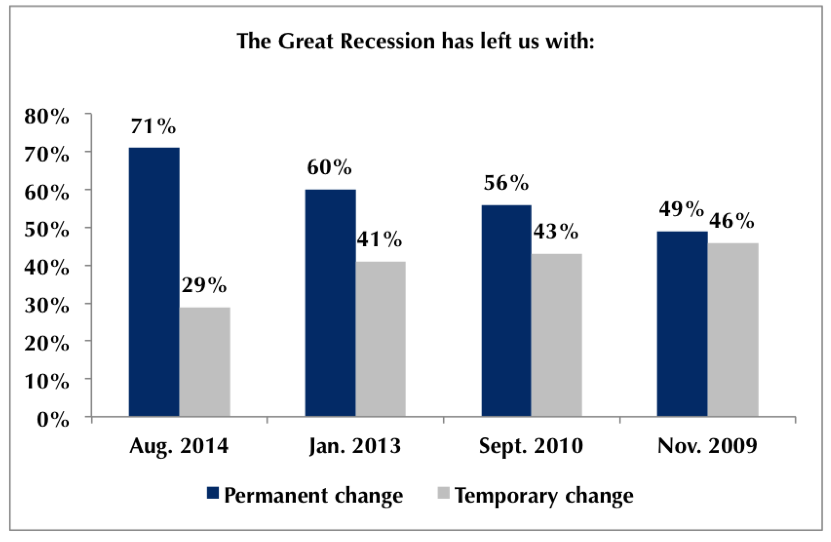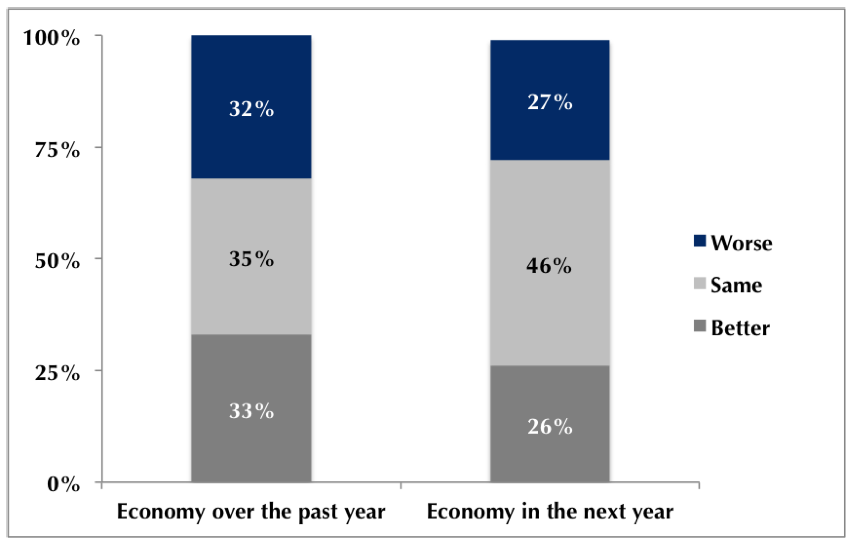This article was last updated on April 16, 2022
Canada: ![]() Oye! Times readers Get FREE $30 to spend on Amazon, Walmart…
Oye! Times readers Get FREE $30 to spend on Amazon, Walmart…
USA: ![]() Oye! Times readers Get FREE $30 to spend on Amazon, Walmart…There is an undercurrent in American society that suggests that the economy just isn't the same now as it was before the Great Recession took jobs, homes and wealth away from millions of American families. A recent study by Cliff Zukin, Carl Van Horn and Allison Kopicki at the John J. Heldrich Center for Workplace Development gives us a sense of just how pessimistic Americans are five years after the so-called end of the latest and greatest recession.
Oye! Times readers Get FREE $30 to spend on Amazon, Walmart…There is an undercurrent in American society that suggests that the economy just isn't the same now as it was before the Great Recession took jobs, homes and wealth away from millions of American families. A recent study by Cliff Zukin, Carl Van Horn and Allison Kopicki at the John J. Heldrich Center for Workplace Development gives us a sense of just how pessimistic Americans are five years after the so-called end of the latest and greatest recession.
The authors begin by noting that, despite the drop in the headline unemployment rate from ten percent to just above six percent, in July 2014, there were still 9.7 million unemployed Americans. In fact, if we look at the total number of American workers that are unemployed, marginally attached and employed part-time for economic reasons, this is what the real, street-level unemployment rate looks like:
In addition, long-term unemployment rates are still above pre-recession levels in over 40 states. The economy is not creating enough jobs to employ all of the new workers who are entering the work force and we need to see the economy create another seven million jobs to retire to the full employment level seen at the beginning of the new millennium, a task that is projected to take until 2019 to achieve.
In the economic world, perception is everything. If Main Street has the perception that the economy is bad or that it will get worse, the pessimistic mindset tends to become reality. A majority and growing number of Americans feel that the Great Recession left the economy in a permanently altered state with irreversible negative shifts in the economy as shown on this graph:
The percentage of Americans who perceive that the economy has undergone permanent negative changes since the Great Recession has risen from 49 percent in November 2009 to 71 percent in August 2014 while the percentage of Americans who feel that the economy has undergone temporary changes has fallen from 46 percent in November 2009 to 29 percent in August 2014. A full 36 percent of Americans feel that the economy will not fully recover from the Great Recession, 24 percent feel that it will take six to ten years to recover and an additional 30 percent feel that it will take three to five years to recover to pre-Great Recession levels. This is particularly interesting given that according to historical patterns, we are due for another recession in the next one to two years.
Here is a list of economic fundamentals and how they are perceived by Americans today:
In July 1999, 56 percent of Americans felt that overall career and job opportunities would be better for the next generation than for their generation; by August 2014, this had plummeted to only 16 percent.
Here is a bar graph showing the percentage of Americans who feel that the current economy is worse, the same or better than it was last year and the percentage of Americans who feel that the economy next year will be worse, the same or better than it is now:
Notice how only one-quarter of Americans feel that the economy will improve over the coming year compared to nearly half that feel that it will be the same as it is now.
Additional surveys show the following about how American workers describe themselves:
14 percent are happy at work
18 percent are well paid
32 percent are better than workers in other countries
33 percent are highly skilled
45 percent take pride in the work that they do
68 percent are highly stressed
70 percent are not secure in their jobs
Taken as a whole, American workers are a stressed, insecure, underpaid, unhappy lot with very little hope that things will improve in the future. One has to wonder what it will take to meaningfully improve the post-Great Recession outlook for America's workforce. In many ways, until the negative mindset of the majority of American workers changes, there is little hope that the economy will achieve its pre-Great Recession performance levels. After all, in the economy, perception really is reality.
Click HERE to read more of Glen Asher's columns
You can publish this article on your website as long as you provide a link back to this page.





Be the first to comment